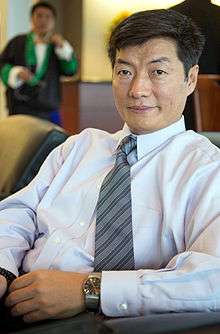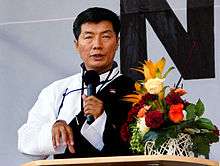Lobsang Sangay
| Lobsang Sangay བློ་བཟང་སེང་གེ་ | |
|---|---|
 | |
| President of the Central Tibetan Administration | |
|
Assumed office 8 August 2011 | |
| Preceded by | Lobsang Tenzin |
| Personal details | |
| Born |
5 September 1968 Darjeeling, India |
| Political party | National Democratic Party |
| Alma mater |
University of Delhi Harvard University |
| Lobsang Sangay | |||||||
| Tibetan name | |||||||
|---|---|---|---|---|---|---|---|
| Tibetan | བློ་བཟང་སེང་གེ | ||||||
| |||||||
| Chinese name | |||||||
| Chinese | 洛桑森格 | ||||||
| |||||||
Lobsang Sangay (Tibetan: བློ་བཟང་སེང་གེ་ , "kind-hearted lion"; born September 5, 1968) is an American lawyer of Tibetan origin. He is the president of the Tibetan-government-in-exile officially known as Central Tibetan Administration (CTA). He has been chief executive of the Tibetan Government-in-Exile since 8 August 2011. Following the election, at the request of the 14th Dalai Lama, the Tibetan parliament-in-exile amended the organisation's bylaws to remove the Dalai Lama's role as ceremonial head of state, making Lobsang Sangay its highest leader. In 2012, to reflect this change, Lobsang Sangay's title as chief executive was changed from kalön tripa ("prime minister") to sikyong ("ruler" or "regent").
Early life and education
Sangay was born in a refugee community in Darjeeling, India in 1968, with a typical Shichak (settlement) background amidst fields, cows and chickens, fetching wood in the forest and helping his parents' small business, including selling winter sweaters.[1][2] After graduating from the Tibetan school in Darjeeling, Sangay received his B.A. (Hons) and LL.B. degrees from the University of Delhi in India. In 1995, the then Kashag offered a Fulbright Scholarship spot to him at Harvard Law School for his role in Chushi Gangdruk affairs, where he subsequently received his LL.M. degree the same year.[3]
Academic career
In 2003, Sangay organized five conferences between Chinese and Tibetan scholars, including a meeting between the Dalai Lama and thirty-five Chinese scholars at Harvard University.[4]
In 2004, he became the first Tibetan to earn a S.J.D. degree from Harvard Law School and was a recipient of the 2004 Yong K. Kim' 95 Prize of excellence for his dissertation Democracy in Distress: Is Exile Polity a Remedy? A Case Study of Tibet's Government-in-exile.[3] In 2006, Sangay was selected as one of the twenty-four Young Leaders of Asia by the Asia Society, a global organization working to strengthen relationships and promote understanding among the people, leaders and institutions of Asia and the United States. Funded by Hao Ran foundation, Sangay was a Senior Fellow at the East Asian Legal Studies Program at Harvard Law School through 2011. He is an expert in Tibetan law and international human rights law.
Governmental career
On 10 March 2011, the 14th Dalai Lama proposed changes to the exile charter to remove his position of authority within the organisation and devolve his political power to the elected leader, thus making the Kalön Tripa (or Chief Minister) the highest-ranking officeholder. These changes were ratified on 29 May 2011,[6] even though, according to Sangay, there was "a high level of anxiety among Tibetans" over the Dalai Lama's decision to relinquish his own political authority.[5]

On 27 April 2011 Sangay was elected Kalön Tripa of the Tibetan Government in Exile.[6][7][8] Sangay won 55% of the votes, defeating Tenzin Tethong (37.4%) and Tashi Wangdi (6.4%). 83,400 Tibetans were eligible to vote and 49,000 ballots were cast.[8] On 8 August 2011, Sangay took the oath of office, succeeding Lobsang Tenzin as Kalön Tripa. In a statement at the time, the Dalai Lama referred to Lobsang Sangay as Sikyong; and the title was officially changed from Kalön Tripa to Sikyong in September 2012.
In his role as Sikyong, Sangay has emphasized the importance of seeking a peaceful, non-violent resolution of the Tibet issue. He has supported the Dalai Lama's call for a so-called "Middle Way" approach "that would provide for genuine autonomy for Tibet within the framework of Chinese constitution." Noting that China has established "one country, two systems" mechanisms in Hong Kong and Macau, he has argued that it makes no sense for China to continue to resist a similar solution for Tibet, which, he emphasizes, would be a "win-win" result.[9]
In February 2013, he gave the first annual lecture of the Indian Association of Foreign Affairs Correspondence. Expressing concern about the possible ripple effects of recent acts of armed rebellion in west Asia, he called for the international community to strengthen its endorsement of non-violent approaches to oppression. "If non-violence is the right thing to do," he emphasized, "we ought to be supported by the international community." Noting the media attention given to armed Syrian "freedom fighters," he said: "Tibetans have been democratic and non-violent for the last so many decades, how come we don't receive similar support and attention?"[10]
Sangay made a statement on 10 March 2013, the 54th anniversary of the Tibetan National Uprising Day, in which he paid tribute to the "yearning for freedom" that inspired "the epochal events of March 10, 1959," and dedicated the anniversary of those events "to all the self-immolators and those who have died for Tibet." He also restated his dedication to the "Middle Way Approach," expressing hope that a "speedy resolution" by China of the Tibet issue could "serve as a model for other freedom struggles" and "be a catalyst for moderation of China."[11]
In January 2017, outgoing US ambassador to India, Richard Verma, hosted Lobsang Sangay for a dinner along with an Indian minister and Richard Gere, an event that angered China.[12][13]
Personal life
Sangay has been married for 13 years to Kesang Yangdon Shakchang, whose parents were from the Lhokha and Phare area. They have a three-year-old daughter.
His father died in 2004.
Lobsang Sangay holds a United States passport[14], which means he holds American citizenship.[15]
Awards and honors
Sangay was awarded Presidential Medal award by Salisbury U, Maryland, USA on 13 October 2015.[16]
He received the Gold Medal of the College Historical Society of Trinity College Dublin for Outstanding Contribution to Public Discourse by the Auditor of the Society, Ms Ursula Ni Choill.[17]
Penpa Tsering Controversy
On 7 November 2017, the Kashag (the CTA's executive, which Sangay heads) dismissed a long-serving Tibetan diplomat, Mr. Penpa Tsering, from the important post of Representative at the Office of Tibet in Washington DC. The former education minister, Ngodup Tsering was appointed to take the position effective 1 December 2017. No clear justification for the dismissal and replacement was initially provided by the Kashag.[18] On 18 November 2017 the Kashag released a 10-point statement of clarification detailing their reasons for dismissing Penpa Tsering.[19] A New York-based Tibetan man writing under the pseudonym "Mila Rangzen" called for a mass protest against the Tibetan exile government on 27 November 2017 to demand justice for the ousted diplomat.[20] The settlement officer of Dharamsala released a statement urging peace in the streets.[21] Nevertheless, on 27 November 2017, a protest took place in Dharamsala near the CTA offices.[22] Sikyong Dr. Lobsang Sangay addressd at Samast Bharat Excellence Award, 2018 on May 24, 2018 at Devdar hotel in Khanyara, dharamshala[23]
Works
- Tibet: Exiles' Journey, Journal of Democracy – Volume 14, Number 3, July 2003, pp. 119–130 Tibet: Exiles' Journey archived
- We Sing a Song of Sadness Tibetan Political Prisoners Speak Out, Billy Jackson, Publish America, 2004, ISBN 1-4137-1677-6
- Lobsang Sangay, China in Tibet: Forty Years of Liberation or Occupation?, Harvard Asia Quarterly, Volume III, No. 3, 1999.
- Human rights and Buddhism : cultural relativism, individualism & universalism, Thesis (LL. M.), Harvard Law School, 1996, OCLC 43348085
- Democracy in distress : is exile polity a remedy? : a case study of Tibet's government in exile, Thesis (S.J.D.), Harvard Law School, 2004, OCLC 62578261
- A constitutional analysis of the secularization of the Tibetan diaspora : the role of the Dalai Lama, in Theology and the soul of the liberal state, ed. Leonard V Kaplan; Charles Lloyd Cohen, Lanham : Lexington Books, 2010, ISBN 978-0-7391-2617-2
See also
References
- ↑ "Lobsang Sangay facebook page". facebook.com. Retrieved December 19, 2011.
- ↑ Toomey, Christine Meet the Heir to the Dalai Lama The Globe and Mail, August 12, 2011
- 1 2 Harvard Law School (27 April 2011). "Lobsang Sangay LL.M. '96 S.J.D. '04 named prime minister of the Tibetan government in exile". News & Events. Retrieved 28 April 2011.
- ↑ "Archived copy". Archived from the original on 2013-10-13. Retrieved 2013-05-07.
- ↑ "The Interview: Dr. Lobsang Sangay". The Diplomat. Retrieved May 12, 2013.
- ↑ Staff (2009). "Lobsang Sangay - Candidate". Kalon Tripa 2011. Retrieved 2010-02-04.
- ↑ Lundsgaard, Cornelius (2011-04-27). "Dr. Lobsang Sangay is the New Political Leader of Tibet". The Tibet Post International. Retrieved 2011-04-29.
- 1 2 "Lobsang Sangay elected Tibetan exile leader". BBC News. 2011-04-27. Retrieved 2011-04-29.
- ↑ "Tibetan leader Lobsang Sangay: Congress needs to hold China to account on Tibet". The Hill. Retrieved May 13, 2013.
- ↑ Arora, Kim. "International community must support non-violent methods: Lobsang Sangay". The Times of India. Retrieved May 13, 2013.
- ↑ "The statement of Sikyong Dr. Lobsang Sangay on the 54th anniversary of the Tibetan National Uprising Day". International Campaign for Tibet. Archived from the original on May 12, 2013. Retrieved May 13, 2013.
- ↑ "China criticises 'Tibet PM' for India dinner", Asian Age, January 29, 2017, retrieved June 7, 2017
- ↑ "Rijiju tweets out US envoy's dinner for Tibet", The Hindu, January 28, 2017, retrieved June 7, 2017
- ↑ "SA's Tibet Problem: An interview with China's public enemy number two, Lobsang Sangay".
Unfortunate too, perhaps, that Sikyong Lobsang Sangay, who travels on a United States passport, can't be so easily denied
- ↑ Raphael Ahren, In 1st Israel visit, a Tibetan leader quietly seeks support, hails Jews’ return, The Times of Israel, June 25, 2018: "Sangay, who spent many years in the US and holds American citizenship."
- ↑ http://www.phayul.com/news/article.aspx?id=36612
- ↑ http://www.tibetswiss.ch/news-fullpage-reader/items/kalon-tripa-awarded-gold-medal-at-trinity-college-dublin.html
- ↑ http://tibet.net/2017/11/kashag-appoints-kalon-ngodup-tsering-as-new-representative-of-north-america/
- ↑ http://tibet.net/2017/11/kashags-clarification-on-decision-to-replace-the-north-america-representative
- ↑ https://www.tibetsun.com/opinions/2017/11/11/tibetan-unity-in-peril-call-for-massive-street-protest-in-dharamshala
- ↑ http://www.ezspk.co.uk/2017/11/14/dharamshala-tibetan-settlement-officer-appeals-for-peace/
- ↑ http://www.phayul.com/news/article.aspx?
- ↑ https://www.youtube.com/watch?v=c_XYNAQ2YOA,
External links
| Wikimedia Commons has media related to Lobsang Sangay. |
- A Review of Lobsang Sangay's Published Scholarly Works
- Interview of Lobsang Sangay as Tibetan Prime Minister in Exile by Asia Times
- Dr.Lobsang Sangay • Special Meeting in Dharamsala
- Audio of the Lobsang Sangay HARDtalk BBC interview
| Political offices | ||
|---|---|---|
| Preceded by Lobsang Tenzin |
President of the Central Tibetan Administration 2011–present |
Incumbent |
| Preceded by Dicki Chhoyang |
Foreign Minister of the Central Tibetan Administration 28 February 2016–present |
Incumbent |